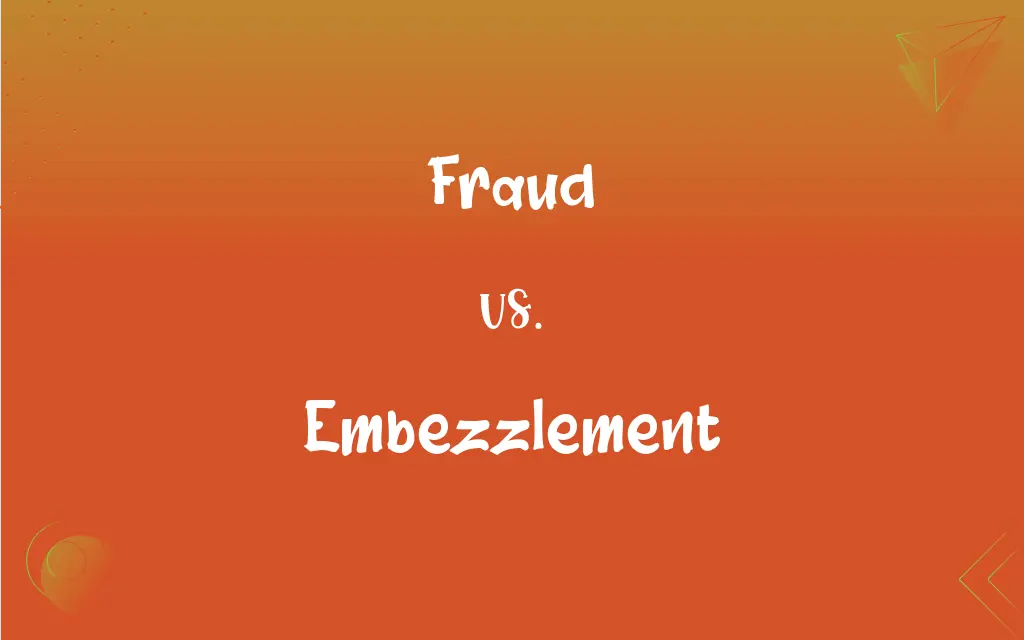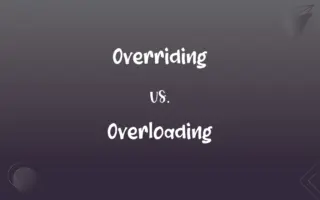Fraud vs. Embezzlement: What's the Difference?
Edited by Janet White || By Harlon Moss || Updated on October 12, 2023
Fraud involves deceit to cause financial loss or gain; embezzlement is misappropriating assets entrusted to one’s care. Both are illegal but differ in method and trust level.

Key Differences
Fraud entails a wide spectrum of intentional deception meant to secure an unlawful gain or to cause a loss to another party. This deceptive activity can manifest in various forms, including insurance fraud, credit card fraud, and securities fraud, each presenting its own set of dynamics and legal ramifications. Contrarily, embezzlement specifically refers to a fiduciary betrayal, where an individual misappropriates funds or property that have been entrusted to them, typically within an employment context.
Diving deeper, fraud encompasses a multiplicity of activities, always with the root element of deceit or misrepresentation meant to facilitate unauthorized benefits to the fraudster. In many instances, the perpetrator of fraud presents something in a misleading manner, intending to induce a person or entity into relinquishing money, property, or some other benefit under false pretenses. Conversely, embezzlement doesn’t typically involve deceit toward the misappropriated assets but is a betrayal of trust wherein the individual covertly reallocates the assets for personal gain.
In cases of fraud, victims are often external entities or individuals who are deceived into parting with their assets. Here, the fraudulent actor may utilize various deceptive mechanisms, such as providing false information, to manipulate the situation. In contrast, embezzlement usually involves an internal actor, often an employee, who exploits their position of trust and accessibility to assets to misappropriate them, thereby violating their fiduciary duty, without overtly deceptive activities toward those assets.
Within the legal sphere, fraud is prosecuted based on the demonstration of intentional deception, financial loss, and unjust gains, and the victim's reliance on the deceit. Meanwhile, embezzlement is prosecuted based on factors like the fiduciary relationship, acquisition of assets through this relationship, and the intentional conversion and ownership of assets. Both crimes, although distinct in their modus operandi and legal attributes, intersect in their unlawful diversion of assets for personal gain.
Mitigating fraud often involves employing mechanisms to validate and verify transactions, scrutinizing discrepancies, and establishing robust auditing processes. To curtail embezzlement, organizations may implement stringent control mechanisms over asset accessibility and management, fostering an environment of accountability and transparency, thus safeguarding assets against internal misappropriation.
ADVERTISEMENT
Comparison Chart
Definition
Deceptive activity for financial or personal gain.
Misappropriation of funds entrusted to an individual.
Legal Framework
Fraud can pertain to various deceptive practices.
Embezzlement specifically involves mishandling of funds.
Intent
Involves intentional deception.
Always involves breach of trust.
Method
Can involve varied methods like scams or false claims.
Involves misusing funds or assets already in custody.
Parties Involved
Can involve outsiders or insiders of an entity.
Involves individuals in positions of trust and access.
ADVERTISEMENT
Fraud and Embezzlement Definitions
Fraud
Fraud entails deliberate deception to secure unfair or unlawful gain.
The executive was convicted of fraud for manipulating the company’s financial statements.
Embezzlement
Embezzlement includes the clandestine transfer of funds for improper use.
The treasurer’s embezzlement of the club’s funds was discovered through a surprise audit.
Fraud
It is a wrongful or criminal act of deceiving for financial or personal benefit.
Insurance fraud is a notable problem, involving false claims to extract unwarranted payouts.
Embezzlement
It is the act of stealing or misusing assets that have been entrusted to you.
The non-profit was devastated by the embezzlement of donations by a trusted staff member.
Fraud
Fraud incorporates misrepresentations or lies to attain undue advantage.
The fraud involved fake identities and phantom companies to siphon off funds.
Embezzlement
It entails illicitly taking funds for personal gain while in a position of trust.
Corporate embezzlement often involves intricate methods to conceal the illicit activity.
Fraud
It involves the intentional manipulation of information or circumstances.
The investor was a victim of fraud when the startup's revenue was grossly overstated.
Embezzlement
Embezzlement involves the misappropriation of funds entrusted to one's care for personal use.
The CFO faced charges of embezzlement after diverting company funds to his personal account.
Fraud
Fraud often involves sophisticated schemes or manipulations to mislead.
Through an elaborate fraud, the criminals siphoned millions from unsuspecting elderly victims.
Embezzlement
Embezzlement involves redirecting assets from their intended use or path illicitly.
She was found guilty of embezzlement for rerouting client payments to her account.
Fraud
A deception practiced in order to induce another to give up possession of property or surrender a right.
Embezzlement
To take (money one has been entrusted with) for personal use.
Fraud
A piece of trickery; a trick.
Embezzlement
The fraudulent conversion of property from a property owner. Category:en:Corruption
Embezzlement
The fraudulent appropriation of property by a person to whom it has been intrusted; as, the embezzlement by a clerk of his employer's money; embezzlement of public funds by the public officer having them in charge.
Embezzlement
The fraudulent appropriation of funds or property entrusted to your care but actually owned by someone else
FAQs
Is embezzlement a criminal offense?
Yes, it is considered a white-collar crime.
Who can commit fraud?
Any individual or entity attempting deception for gain.
What are common types of fraud?
Identity theft, insurance fraud, credit card fraud, etc.
How does embezzlement differ from theft?
Embezzlement involves betraying trust and misusing entrusted funds, while theft is taking without prior access or trust.
Who typically commits embezzlement?
Individuals in positions of trust with access to funds.
What are examples of embezzlement?
Taking money from a company’s account or misusing organizational funds for personal use.
What is fraud?
Deliberate deception to secure unfair or unlawful gain.
What are the consequences of embezzlement?
Legal action, restitution, fines, and potential imprisonment.
Who investigates fraud?
Agencies like the FBI, police, or internal organizational structures.
What is the difference between fraud and a scam?
Scams are schemes to deceive and defraud, while fraud is the act of deceiving for unjust gain.
Can embezzlement be accidental?
No, embezzlement involves intentional misappropriation of funds.
How is embezzlement discovered?
Often through audits, financial reviews, or noticeable discrepancies.
Can embezzlement occur in non-profit organizations?
Yes, anyone with access to funds can potentially embezzle, regardless of the organization type.
How can fraud be prevented?
Through vigilance, secure practices, and regular audits.
What are red flags indicating potential fraud?
Inconsistencies in records, secretive behavior, or suspicious transactions.
What impact does fraud have on victims?
Financial loss, emotional distress, and potential legal complications.
Is embezzlement only related to money?
Primarily, but it can also involve property or other assets that can be converted into money.
Is fraud a global issue?
Yes, fraud can and does occur worldwide.
What is embezzlement?
Misappropriation of funds entrusted to one's care.
Is all fraud illegal?
While morally wrong, not all fraud is illegal; it can be civil or criminal.
About Author
Written by
Harlon MossHarlon is a seasoned quality moderator and accomplished content writer for Difference Wiki. An alumnus of the prestigious University of California, he earned his degree in Computer Science. Leveraging his academic background, Harlon brings a meticulous and informed perspective to his work, ensuring content accuracy and excellence.
Edited by
Janet WhiteJanet White has been an esteemed writer and blogger for Difference Wiki. Holding a Master's degree in Science and Medical Journalism from the prestigious Boston University, she has consistently demonstrated her expertise and passion for her field. When she's not immersed in her work, Janet relishes her time exercising, delving into a good book, and cherishing moments with friends and family.































































